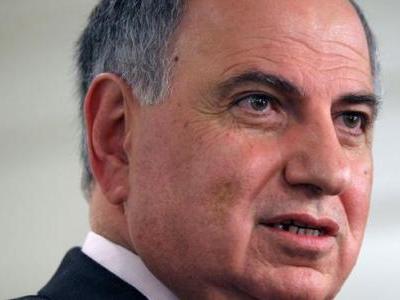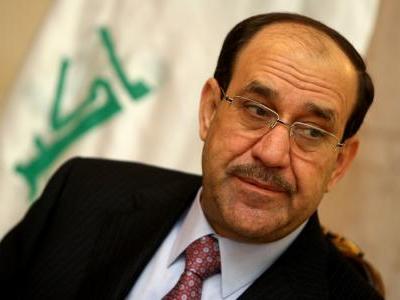Wed, 11/04/2015 - 22:17
Dead Man Slamming: Notes on the Death of Salesman Chalabi
The messenger has gone into that good night. And in death, the chroniclers, pundits and lawmakers are still shooting him.
But then Ahmad Chalabi was more than just a messenger. He was a regime change peddler and so, when news of the 71-year-old Iraqi politician’s death broke Tuesday, we were having our death of a salesman moment.

That’s how Chalabi will forever be remembered. As the New York Times headline put it, the “Iraqi Politician Who Pushed for U.S Invasion Dies at 71.” Swap “Pushed” for “Lobbied” and you get the Wall Street Journal obit headline.
US Congress members -- most of who approved the 2003 Iraq invasion -- took it even further. “I didn’t remember who he was… I didn’t even know he died,” Sen. James Inhofe, a former Senate Armed Services Committee member, who voted for the Iraq War, told Foreign Policy. Sen. John McCain, current chairman of the panel, blandly maintained, “Chalabi never had any influence on me.”
Oh really. What could be lowlier than slamming a dead man? Surely it’s reducing his villainy to insignificance or depriving him of his claim to infamy. Only a Congressman would stoop so low.
Not to be outdone, the airwaves also kept apace with the dead man slamming. Speaking to the BBC, Richard Bonin, author of Arrows of the Night: Ahmad Chalabi and the Selling of the Iraq War, noted that, “no foreigner has ever had as much influence on leading the US to war.”
Every now and then history throws up these characters imbued with an exalted sense of self-importance, men [since I can’t think of any women] impassioned with the righteousness of their cause, who have banged the drums of war.
In France, we had the tanned, open-shirted “public intellectual” Bernard-Henri Levy who, by his own well-documented admission, played a pivotal role persuading then French President Nicolas Sarkozy to back the Libyan rebels in the 2011 uprising against Muammar Gaddafi.
In his documentary, Le Serment de Tobrouk, or The Oath of Tobruk, Levy details a period in modern French history that has several Frenchmen and women wincing in embarrassment. That was the dark period when a notoriously self-promoting leftist intellectual joined forces with a notoriously energetic conservative president to wage war in a distant, sandy nation.
Saddam and Gaddafi have gone
Why did “BHL,” as the French call Levy, take it upon himself to lead the charge in the 2011 Libyan intervention?

A psychoanalyst or BHL critic would offer many reasons. But if we take the man at his word, it was the legacy of guilt over the West’s response -- or lack thereof -- to the crises in Bosnia and Afghanistan in the 1990s.
That, along with a nod to the World War II-era “Oath of Kufra,” when Free French Forces in Libya pledged not to lay down their arms until France was liberated from the Nazis, led BHL to take his “Oath of Tobruk” not to shut-up until Libya was liberated from Gaddafi.
Now Gaddafi and Saddam have gone and what a mess we have in store.
But let’s get one thing clear: the mess in Libya and Iraq today is not so much the fault of military interventions or invasions as the failure to manage post-conflict transitions.
We had it coming in Libya
In Libya frankly, we should have seen it coming, but we didn’t want to.
When a populace takes up arms -- either from Gaddafi’s barracks or weapons supplied by Qatar, the UAE and France -- and when a motley mix of tailors, bakers, butchers and former prisoners suddenly turn into resistance heroes, the party at some point must end. The armed heroes defending their towns and cities must be disarmed and reintegrated into society.
We know this very well. We have plenty of very well-paid DDR (demobilization, disarmament and reintegration) experts working for the UN, flinging their post-conflict acronyms and flying on coveted, sky blue UN diplomatic passports across the globe.
They rarely, if ever, have a 100% success rate, but in Libya, we never gave DDR a shot. We simply expected the Libyans -- with little governing expertise and civil society experience after those Gaddafi years -- to handle it themselves.
They tried. And they failed. The Libyan National Transitional Council (NTC) set up a Warriors’ Affairs Commission. But the commission was overwhelmed, there were allegations of fake demobilization requisitions, there were no arrangements or systems in place for returned weapons and the entire program flopped.
We had it coming in Iraq
In Iraq, it was the de-Baathification process, which disqualified military officials and civil servants of the old regime, that led to the collapse of security and subsequent Sunni disenfranchisement.
In Libya too, there was a failure to reach out to functionaries of the old regime with the “Gaddafi loyalist” label being cavalierly brandied by “resistance heroes” flush with victory.
We know the perils of victors disregarding the need for reconciliation, but somehow the US never quite manages that despite some neat “winning hearts and minds” slogans.
By all accounts Chalabi played a key role in sidelining Sunnis, particularly under former Prime Minister Nouri al-Maliki, under whose premiership Sunni-targeting reached a high point.
But then don’t forget Maliki was our man in Iraq. As Dexter Filkins, in his magnificent New Yorker piece, reported, it was former US Ambassador to Iraq Zalmay Khalizad, on a CIA analyst’s advice, who pushed for a then unknown Maliki to lead Iraq back in 2006.

The George W. Bush administration and its band of merry neo-con men were blissfully clueless about the can of worms they were about to release in Iraq.
In the lead-up to the 2003 invasion, the likes of Richard Perle, Paul Wolfowitz and Douglas Feith were doing what it takes to justify regime change in Baghdad.
Let’s be clear: By 2002, Chalabi was already a distrusted figure in Washington and Langley circles. A Jordanian court had already sentenced him in absentia to prison for financial fraud in the Petra Bank case.
Back in 1996, Chalabi disastrously interfered with a failed CIA plot to overthrow Saddam. A New York Times report from that period noted the secret plot “was far from secret and its chances of success were small.” The article went on to name the “two main resistance organizations receiving money from the C.I.A., the Iraqi National Congress, formed in 1992, and the Iraqi National Accord, formed in 1990, have not been terribly secretive about the source of that support.”
The Iraqi National Congress of course was Chalabi’s baby. During the sanctions/no-fly zone era, as well as in the lead-up to the 2003 invasion, we journalists duly put in our phone calls and made our way to London to interview Chalabi’s tribe of anti-Saddam Iraqi exiles.
But that’s beside the point. The fact is, by 2003, Chalabi was a discredited figure in CIA and DC circles. If he managed to push faulty intelligence on Saddam’s weapons of mass destruction and lead the Iraqi exile charge for regime change, it’s because the White House needed someone to fulfill the role.
In other words, if Chalabi hadn’t fit the bill, the Bush era neo-cons would have found someone else. The scion of a wealthy, secular Iraqi Shiite family did enable the US to suspend disbelief on the threat posed by Saddam. But that’s because disbelief was undervalued those days in the land of the true believers. There’s really no need to slam the dead man. Blame Bush -- and Perle and Wolfowitz and Rumsfeld and Feith and all those guys who are still alive instead.
But then Ahmad Chalabi was more than just a messenger. He was a regime change peddler and so, when news of the 71-year-old Iraqi politician’s death broke Tuesday, we were having our death of a salesman moment.

That’s how Chalabi will forever be remembered. As the New York Times headline put it, the “Iraqi Politician Who Pushed for U.S Invasion Dies at 71.” Swap “Pushed” for “Lobbied” and you get the Wall Street Journal obit headline.
US Congress members -- most of who approved the 2003 Iraq invasion -- took it even further. “I didn’t remember who he was… I didn’t even know he died,” Sen. James Inhofe, a former Senate Armed Services Committee member, who voted for the Iraq War, told Foreign Policy. Sen. John McCain, current chairman of the panel, blandly maintained, “Chalabi never had any influence on me.”
Oh really. What could be lowlier than slamming a dead man? Surely it’s reducing his villainy to insignificance or depriving him of his claim to infamy. Only a Congressman would stoop so low.
Not to be outdone, the airwaves also kept apace with the dead man slamming. Speaking to the BBC, Richard Bonin, author of Arrows of the Night: Ahmad Chalabi and the Selling of the Iraq War, noted that, “no foreigner has ever had as much influence on leading the US to war.”
Every now and then history throws up these characters imbued with an exalted sense of self-importance, men [since I can’t think of any women] impassioned with the righteousness of their cause, who have banged the drums of war.
In France, we had the tanned, open-shirted “public intellectual” Bernard-Henri Levy who, by his own well-documented admission, played a pivotal role persuading then French President Nicolas Sarkozy to back the Libyan rebels in the 2011 uprising against Muammar Gaddafi.
In his documentary, Le Serment de Tobrouk, or The Oath of Tobruk, Levy details a period in modern French history that has several Frenchmen and women wincing in embarrassment. That was the dark period when a notoriously self-promoting leftist intellectual joined forces with a notoriously energetic conservative president to wage war in a distant, sandy nation.
Saddam and Gaddafi have gone
Why did “BHL,” as the French call Levy, take it upon himself to lead the charge in the 2011 Libyan intervention?

A psychoanalyst or BHL critic would offer many reasons. But if we take the man at his word, it was the legacy of guilt over the West’s response -- or lack thereof -- to the crises in Bosnia and Afghanistan in the 1990s.
That, along with a nod to the World War II-era “Oath of Kufra,” when Free French Forces in Libya pledged not to lay down their arms until France was liberated from the Nazis, led BHL to take his “Oath of Tobruk” not to shut-up until Libya was liberated from Gaddafi.
Now Gaddafi and Saddam have gone and what a mess we have in store.
But let’s get one thing clear: the mess in Libya and Iraq today is not so much the fault of military interventions or invasions as the failure to manage post-conflict transitions.
We had it coming in Libya
In Libya frankly, we should have seen it coming, but we didn’t want to.
When a populace takes up arms -- either from Gaddafi’s barracks or weapons supplied by Qatar, the UAE and France -- and when a motley mix of tailors, bakers, butchers and former prisoners suddenly turn into resistance heroes, the party at some point must end. The armed heroes defending their towns and cities must be disarmed and reintegrated into society.
We know this very well. We have plenty of very well-paid DDR (demobilization, disarmament and reintegration) experts working for the UN, flinging their post-conflict acronyms and flying on coveted, sky blue UN diplomatic passports across the globe.
They rarely, if ever, have a 100% success rate, but in Libya, we never gave DDR a shot. We simply expected the Libyans -- with little governing expertise and civil society experience after those Gaddafi years -- to handle it themselves.
They tried. And they failed. The Libyan National Transitional Council (NTC) set up a Warriors’ Affairs Commission. But the commission was overwhelmed, there were allegations of fake demobilization requisitions, there were no arrangements or systems in place for returned weapons and the entire program flopped.
We had it coming in Iraq
In Iraq, it was the de-Baathification process, which disqualified military officials and civil servants of the old regime, that led to the collapse of security and subsequent Sunni disenfranchisement.
In Libya too, there was a failure to reach out to functionaries of the old regime with the “Gaddafi loyalist” label being cavalierly brandied by “resistance heroes” flush with victory.
We know the perils of victors disregarding the need for reconciliation, but somehow the US never quite manages that despite some neat “winning hearts and minds” slogans.
By all accounts Chalabi played a key role in sidelining Sunnis, particularly under former Prime Minister Nouri al-Maliki, under whose premiership Sunni-targeting reached a high point.
But then don’t forget Maliki was our man in Iraq. As Dexter Filkins, in his magnificent New Yorker piece, reported, it was former US Ambassador to Iraq Zalmay Khalizad, on a CIA analyst’s advice, who pushed for a then unknown Maliki to lead Iraq back in 2006.

The George W. Bush administration and its band of merry neo-con men were blissfully clueless about the can of worms they were about to release in Iraq.
In the lead-up to the 2003 invasion, the likes of Richard Perle, Paul Wolfowitz and Douglas Feith were doing what it takes to justify regime change in Baghdad.
Let’s be clear: By 2002, Chalabi was already a distrusted figure in Washington and Langley circles. A Jordanian court had already sentenced him in absentia to prison for financial fraud in the Petra Bank case.
Back in 1996, Chalabi disastrously interfered with a failed CIA plot to overthrow Saddam. A New York Times report from that period noted the secret plot “was far from secret and its chances of success were small.” The article went on to name the “two main resistance organizations receiving money from the C.I.A., the Iraqi National Congress, formed in 1992, and the Iraqi National Accord, formed in 1990, have not been terribly secretive about the source of that support.”
The Iraqi National Congress of course was Chalabi’s baby. During the sanctions/no-fly zone era, as well as in the lead-up to the 2003 invasion, we journalists duly put in our phone calls and made our way to London to interview Chalabi’s tribe of anti-Saddam Iraqi exiles.
But that’s beside the point. The fact is, by 2003, Chalabi was a discredited figure in CIA and DC circles. If he managed to push faulty intelligence on Saddam’s weapons of mass destruction and lead the Iraqi exile charge for regime change, it’s because the White House needed someone to fulfill the role.
In other words, if Chalabi hadn’t fit the bill, the Bush era neo-cons would have found someone else. The scion of a wealthy, secular Iraqi Shiite family did enable the US to suspend disbelief on the threat posed by Saddam. But that’s because disbelief was undervalued those days in the land of the true believers. There’s really no need to slam the dead man. Blame Bush -- and Perle and Wolfowitz and Rumsfeld and Feith and all those guys who are still alive instead.
Tags for all blogs :
Comments or opinions expressed on this blog are those of the individual contributors only, and do not necessarily represent the views of FRANCE 24. The content on this blog is provided on an "as-is" basis. FRANCE 24 is not liable for any damages whatsoever arising out of the content or use of this blog.




0 Comments
Post new comment